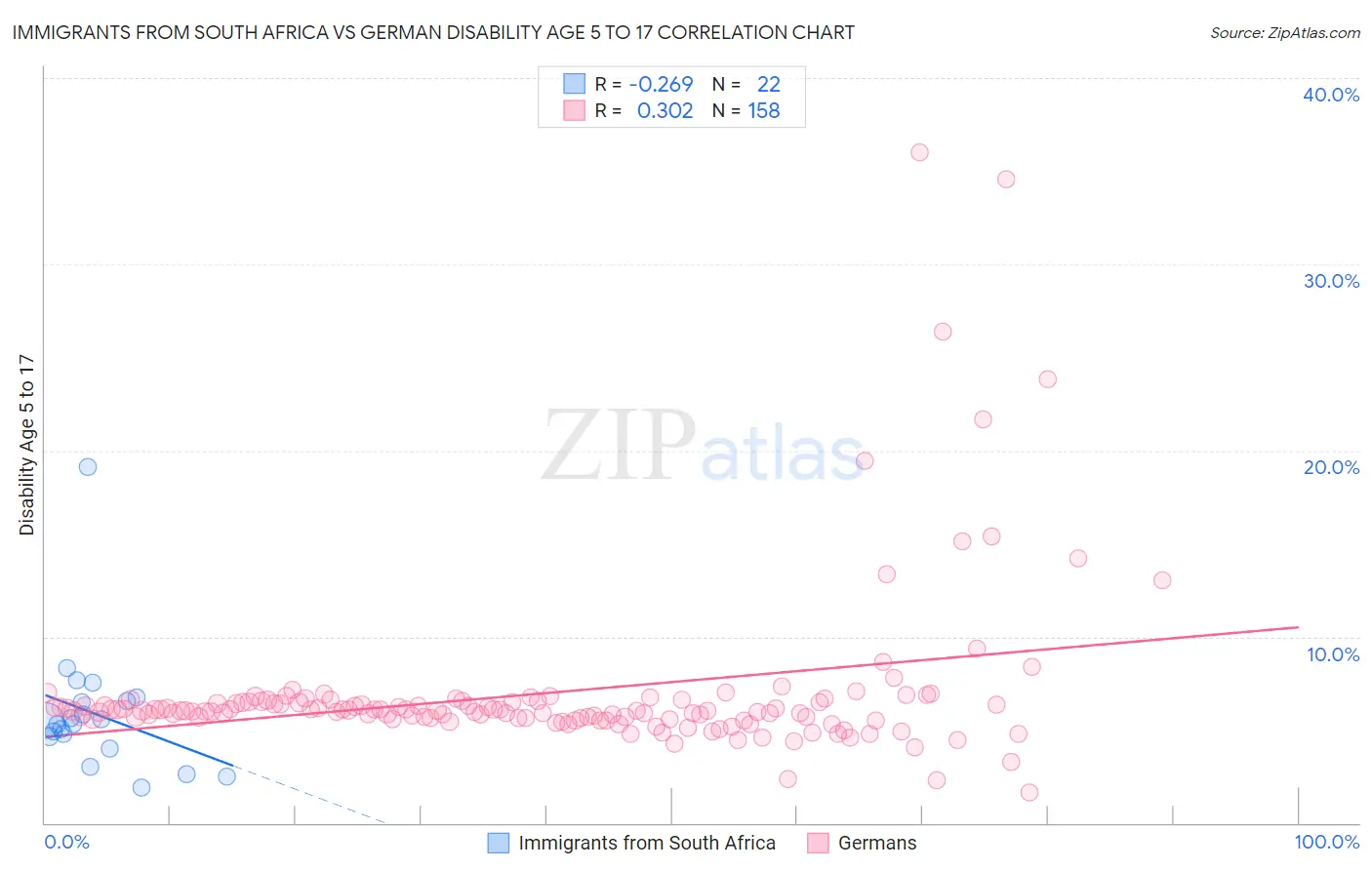Immigrants from South Africa vs German Disability Age 5 to 17
COMPARE
Immigrants from South Africa
German
Disability Age 5 to 17
Disability Age 5 to 17 Comparison
Immigrants from South Africa
Germans
5.3%
DISABILITY AGE 5 TO 17
98.1/ 100
METRIC RATING
108th/ 347
METRIC RANK
6.1%
DISABILITY AGE 5 TO 17
0.0/ 100
METRIC RATING
282nd/ 347
METRIC RANK
Immigrants from South Africa vs German Disability Age 5 to 17 Correlation Chart
The statistical analysis conducted on geographies consisting of 231,812,836 people shows a weak negative correlation between the proportion of Immigrants from South Africa and percentage of population with a disability between the ages 5 and 17 in the United States with a correlation coefficient (R) of -0.269 and weighted average of 5.3%. Similarly, the statistical analysis conducted on geographies consisting of 564,502,598 people shows a mild positive correlation between the proportion of Germans and percentage of population with a disability between the ages 5 and 17 in the United States with a correlation coefficient (R) of 0.302 and weighted average of 6.1%, a difference of 15.4%.

Disability Age 5 to 17 Correlation Summary
| Measurement | Immigrants from South Africa | German |
| Minimum | 1.9% | 1.7% |
| Maximum | 19.1% | 36.0% |
| Range | 17.3% | 34.3% |
| Mean | 5.9% | 7.0% |
| Median | 5.4% | 6.0% |
| Interquartile 25% (IQ1) | 4.6% | 5.6% |
| Interquartile 75% (IQ3) | 6.5% | 6.5% |
| Interquartile Range (IQR) | 1.9% | 0.88% |
| Standard Deviation (Sample) | 3.4% | 4.5% |
| Standard Deviation (Population) | 3.3% | 4.5% |
Similar Demographics by Disability Age 5 to 17
Demographics Similar to Immigrants from South Africa by Disability Age 5 to 17
In terms of disability age 5 to 17, the demographic groups most similar to Immigrants from South Africa are Russian (5.3%, a difference of 0.040%), Immigrants from Northern Africa (5.3%, a difference of 0.040%), Immigrants from Yemen (5.3%, a difference of 0.070%), Immigrants from Eritrea (5.3%, a difference of 0.080%), and Ethiopian (5.3%, a difference of 0.12%).
| Demographics | Rating | Rank | Disability Age 5 to 17 |
| Menominee | 98.7 /100 | #101 | Exceptional 5.3% |
| Nicaraguans | 98.6 /100 | #102 | Exceptional 5.3% |
| Salvadorans | 98.6 /100 | #103 | Exceptional 5.3% |
| Peruvians | 98.5 /100 | #104 | Exceptional 5.3% |
| Immigrants | Italy | 98.4 /100 | #105 | Exceptional 5.3% |
| Immigrants | Yemen | 98.2 /100 | #106 | Exceptional 5.3% |
| Russians | 98.2 /100 | #107 | Exceptional 5.3% |
| Immigrants | South Africa | 98.1 /100 | #108 | Exceptional 5.3% |
| Immigrants | Northern Africa | 98.1 /100 | #109 | Exceptional 5.3% |
| Immigrants | Eritrea | 98.0 /100 | #110 | Exceptional 5.3% |
| Ethiopians | 97.9 /100 | #111 | Exceptional 5.3% |
| Immigrants | Latvia | 97.9 /100 | #112 | Exceptional 5.3% |
| Aleuts | 97.8 /100 | #113 | Exceptional 5.3% |
| Immigrants | Northern Europe | 97.8 /100 | #114 | Exceptional 5.3% |
| Cubans | 97.8 /100 | #115 | Exceptional 5.3% |
Demographics Similar to Germans by Disability Age 5 to 17
In terms of disability age 5 to 17, the demographic groups most similar to Germans are Ugandan (6.2%, a difference of 0.16%), Subsaharan African (6.2%, a difference of 0.19%), English (6.2%, a difference of 0.19%), Colville (6.2%, a difference of 0.23%), and Scottish (6.1%, a difference of 0.25%).
| Demographics | Rating | Rank | Disability Age 5 to 17 |
| Dutch | 0.2 /100 | #275 | Tragic 6.0% |
| Japanese | 0.1 /100 | #276 | Tragic 6.1% |
| Puget Sound Salish | 0.1 /100 | #277 | Tragic 6.1% |
| Immigrants | Liberia | 0.1 /100 | #278 | Tragic 6.1% |
| Immigrants | Jamaica | 0.1 /100 | #279 | Tragic 6.1% |
| Portuguese | 0.1 /100 | #280 | Tragic 6.1% |
| Scottish | 0.0 /100 | #281 | Tragic 6.1% |
| Germans | 0.0 /100 | #282 | Tragic 6.1% |
| Ugandans | 0.0 /100 | #283 | Tragic 6.2% |
| Sub-Saharan Africans | 0.0 /100 | #284 | Tragic 6.2% |
| English | 0.0 /100 | #285 | Tragic 6.2% |
| Colville | 0.0 /100 | #286 | Tragic 6.2% |
| Pima | 0.0 /100 | #287 | Tragic 6.2% |
| Jamaicans | 0.0 /100 | #288 | Tragic 6.2% |
| Yaqui | 0.0 /100 | #289 | Tragic 6.2% |